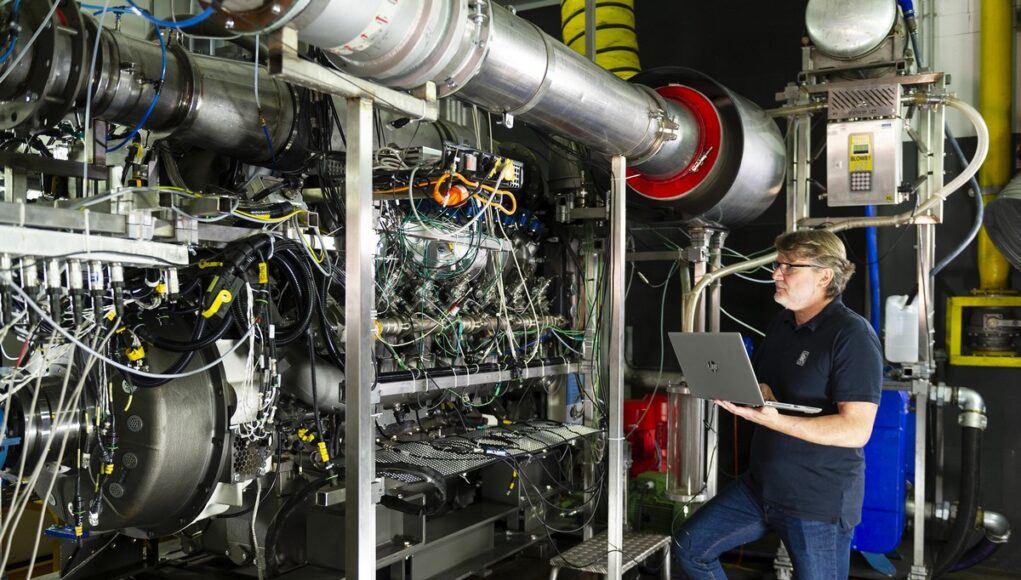Rolls-Royce has confirmed the successful completion of trials for a 12-cylinder gas variant of the mtu Series 4000 L64 engine, which operates on 100% hydrogen fuel.
The evaluations, conducted by the Power Systems business unit, displayed “exceptional” results with regards to efficiency, performance, emissions, and combustion.
These trials signify a significant milestone in the company’s efforts to bring hydrogen solutions to market and meet customer demand for more sustainable energy solutions.
The first implementation of mtu engines powered by 100% hydrogen is scheduled for the enerPort II lighthouse project in the German inland port of Duisburg, as part of the development of a climate-neutral energy supply for a new container terminal.
Dr Jörg Stratmann, CEO – Rolls-Royce Power Systems, was quoted as saying:
“We see hydrogen as one of the central elements of the energy transition. It can be used for both storage of excess energy and as a fuel, not only for engines but fuel cells and cogeneration plants to generate climate-neutral electricity and heat.”














Meant to be building a massive hydrogen plant in teesside, hopefully it gets built. Looks like most big players in energy and engines are looking at hydrogen to be the future.
A hydrogen importing facility from what I hear. i.e. import ammonia and then crack it to generate H2 in situ. I’m a bit dubious about the overall process efficiency.
Hydrogen is not really the future, it’s an heresy with the current technology
Why not- and what is?
Because of the lack of a safe storage solution for massive use:
But mostly because of poor production technology, which makes hydrogen far from a green, long-term sustainable, mass-market solution, even if some are promising.
It’s just a poor alternative to oil because of the lack of an acceptable alternative.
I think hydrogen is definitely part of the future, What about all the solar energy we could produce in summer? Hydrogen would seem the obvious storage medium for winter usage. Use it in fuel cells for trains and buses. Mix it directly into the gas supply. I’ve already bought my hydrogen ready boiler. Minimum transformation losses.
Agree use as a replacement for diesel is a stretch….but if you can make it work you are onto something. There’s a century’s worth of diesel engines out there….
It’s nice if its ‘green’ but it doesn’t have to be. It’s clean when burnt either way.
I don’t see that sort of hydrogen storage capacity as sensible.
However, we can have massive excess wind power peaks that can be converted.
The issue is the scale of electrolysis you need to soak up that much power! How much plant is sat idle 60% of the time?
As a PhD chemist I find most of the conversations around industrial hydrogen production highly dishonest as the efficiency of any proposals I’ve seen is joke level. As others have said it would be **less** polluting and *more* energy efficient to use diesel through a proper Euro6 setup.
Yes, that’s exactly it.
People think that because it comes from a renewable source, it is efficient or “free”, and forget that hydrogen production is very energy consuming, and that the scale needed to replace oil with energy is… out of the question for hydrogen in the current state of technology…
Some of the new membrane technologies I have seen look very promising, one actually improves its efficiency through use (a problem for most of this type of tech) and it works simply by heat from the Sun. Scaling up will be the issue of course from these sort of prototypes
Well you would do the same for wind of course. My point is I’d like to see see some efficiency numbers worked out. Lithium batteries vs mineshaft ‘flywheels’ vs good old fashioned hydro.
I agree Eur6 diesel has legs. I own an eur5 car which I fully intend to get a million miles out of. It’s quite possible. I do 6k miles a year. It will see me out. I have to ask the question why do we need to keep making so many cars…we are already awash the damn things..what is the environmental cost?
Fewer cars would mean less steel which might mean you could make what you need with hydrogen…what’s needed is a holistic and comprehensive balancing of our economic models.
Hydro suffers from lack of sites and capacity.
If you know any mountains the environmentalists would let the hydro companies carve up….
Lithium batteries are a small part of the answer.
I like the idea of liquified air – you can use that process to bulk remove CO2 if you like……
There is another proposal for a barrier across The Wash.
Physics is not really favorable to humans.
Solar -> Hydrogen is one of the least efficient ways to produce hydrogen.
It is only interesting if you use “wasted” solar energy to produce hydrogen that can be used later.
But if you start building dedicated hydrogen facilities out of current solar production technology or even a nuclear power plant, it will be an environmental (and economic) disaster.
Hydrogen is interesting, but we have no way to really industrialize its production, not today and not in the next decade at least.
Waste wind power is a local possibility. Maybe powering hydrogen generators at say fueling stations on the grid. Problem is that 72kW (3 phase 100A supply) ends up as 20-30kW of hydrogen output. Quite the loss.
Much more likely desert solar production TBH. Economics look terrible even for that. But at least the sunshine is free.
Energy density is terrible and storage or transport a nightmare.
I saw all these types of arguments used against electric cars and people are buying electric cars despite all the difficulties. The arguments are valid to a point but are based on existing methods of energy production. Once you remove fosil fuels and introduce a combination of renewables and nuclear (Fission or Fusion) and get better batteries (a lot of work going into that at the moment) then Hydrogen will come into the mix mainly to displace natural gas but possibly for ships etc. True things need to change – but let’s face it they are.
The problem is that there are many “ifs”.
Fission is limited, uranium is not unlimited on earth.
Fusion is not for the near future, if it is even possible…
A better battery is the easiest thing here and it doesn’t affect production.
Jumping into another boat without even being sure it will float, I don’t call that a responsible choice.
Fusion is the interesting one and there is an incredible amount of work going on here. Ignition has been achieved and the concept of getting more energy out than you put in also achieved. I would be surprised if it failed to deliver the only question is when. That said because Fusion is far safer than fission I would expect the build time for fusion plants to be far faster than Fission and perhaps Sizewell C will be the last fission reaction built in this country.
As for jumping on boats that is exactly what the private sector has been doing for centuries. If there is a need and it is physically possible it will be done hence RR forging forward..
Ignition, maintaining fusion, and energy recovery are three challenges on a different scale of difficulty, equivalent to a human becoming a god.
Ignition is easy, we have been able to do it for decades.
But the other two are much more difficult.
Don’t count on fusion, we don’t even know if it’s possible, the research and billions of dollars are really only done to make sure it’s possible, not to build an industrial reactor.
Also, just because fusion reactors are safer doesn’t mean they are faster to build, the technology, at least in its current form, is much more complicated than fission.
That’s what I’m saying. ….’wasted solar energy ‘….come the 6 months between the equinoxes I’m going to generating quite a lot of it. I plan to store as much as I can to allow for 3-4 cloudy days but I will nevertheless be putting quite a lot into the grid. The current favourite storage option will mean turning vast tracks of some countries into moonscapes for lithium, and copper. A Hyundai IONIC puts 1/3 tonne load on each wheel. We’ll all be driving tanks, or rather sitting in traffic queues in them instead of petrol and diesel cars .This EV thing has not been thought through. There is a role for chemical fuels…they have the energy per kg. It makes sense to look at evolving the combustion engines.
We’ve got new players in the field and energy retention technology is constantly evolving. For example heating stone and brick in a fire and using it at night has been a human tradition of harnessing heat and energy even when the energy source is not always working.
In a similar vein a company plans to make ‘brick banks’ that are heated up by elements when there is excess and those rocks hold the heat very well in an adequately shielded environment.
There’s a couple of videos on these alternative storage methods out already. And its not like this seems too complicated or environmentally damaging compared to having the current lithium mining that also has child labour involved.
Of course the conversion of heat into electricity is more of a complicated matter.
If by the conversion of heat into electricity you mean using gas turbines to generate electrical power that you subsequently convert back again into heat albeit using a heat pump I will take some persuading that this is thermodynamically more efficient than just having a gas boiler fed with a mixture of natural gas and hydrogen made from renewables. By all means install heat pumps on new build housing but for existing stock I think it makes more sense to roll out community solar arrays – the houses in a locality which have suitable roofs get PV panels but all houses get storage batteries – i.e. the solar energy is shared on a community basis.
Also, the temperature gradients of a deep coal mine is 30C / km.
Some UK mine seams are at 60C and higher. We should be thinking on terms of deep mine community heat pump systems rather than inefficient and noisy air heat pumps for individual buildings.
All factory buildings should have PV panels installed and surplus transferred to national grid or local storage for community use
Absolutely!
The combustion engine hasn’t changed substantially since the horse was but out to grass. However when it arrived it revolutionised our world. I think the same is about to happen. Expect different types of batteries, lighter maybe, faster charging. There are a lot of assumptions being made at the moment but one thing is for sure – you can never have enough energy
Yeh, solid state batteries look interesting. They are going to have to get the weight down and cost. I’m not going to spend £25k to replace a car that returns 50mpg, has less than 60k miles on the clock has a range of over 500 miles on a tank and is valued at just £5k. You can whistle.
I think for ship engines it will be very practical far less so for aviation sadly certainly without substantial redesign of aircraft shapes, efficiencies and aerodynamics though Boeing and Airbus are both doing work in these directions. Swiss Air are apply a shark like film to their aircraft giving a 1% efficiency saving but that saves them a million dollars a year so for a large airline it could be enormous if we can fine 5 plus % efficiencies to save on fuel consumption and costs.
I don’t know enough about it to express an authoratative engineering opinion. But I am happy to make provocative comments e.g. why do we need so much globalisation. I can live without New Zealand lamb and kiwi fruits. That’s a couple of ships and diesel engines saved for a start. I could probably live without Brazilian beef burgers. Welsh hills produce more lamb than we can eat
In the UK. As a youth we used to have scrag end of neck…very tasty. There’s another couple saved, and as a by product more rain forest is left standing to soak up more CO2. Turns out trees are pretty good at converting CO2 to plain old O2.
My plumber fitted a hydrogen boiler to a new build in London. It needed half an hour to fill a bath. They had to retrofit a hot water tank in the end. Pure hydrogen fuel lacks enough energy, but mixed with natural gas, it would make a great short term solution.
I think mine is designed to use up to 15% hydrogen.
Agree it is a candidate for short and medium term solution. Natural gas will be with us for decades yet. Makes sense to use it ( with hydrogen) to heat homes and just stop using it to generate electricity. Pragmatic approach rather than evangelical is what we need.
Current boilers are capable of utilising a 20-25% blend of hydrogen and there are plans to introduce such a blend possibly within months. Not advertised as the Government would rather we all switched to heat pumps.
Duly noted. Thanks.
To be honest, I think that the application of Hydrogen is going to be limited. Just a couple of points.
Due to its molecular size, hydrogen has to be stored and potentially distributed at ~10,000 psi to be utilisable for use in combustion engines (I presume domestic boilers might be a bit less, but probably not by much); for reference, our existing UK gas distribution network runs at ~1200 psi for the big mains, and 0.3 psi coming into your home. Even if blended with natural gas (NG), the operating pressure is going to need to be a lot higher than the current spec I would expect- meaning a wide scale refit of the entire network to make sure it can cope with the higher pressure. Also, because of that molecular size, wall thickness of pipe and spec of jointing etc. would also need to be uprate- again a very high expense for refitting the country’s gas distribution network.
Also, in terms of efficiency, electrolysis of hydrogen (electrical cracking) runs at about 70-80% (let’s call it 75%). Running it through the most efficient type of gas fired power station (a CCGT) has an efficiency of 50%, so you’ve got an end point efficiency of 37.5% for the electricity you’re putting in. There are a number of other more efficient ways of storing large quantities of electrical power, that don’t require large quantities of a flammable gas stored at 10,000 psi. So, I don’t see it being used as country-wide power generation either.
The only place I really see a potential use for it is for fuel for mass transit and potentially commercial (buses and trucks), but I’ve not looked into the efficiencies too much.
All good points. Every day is a school day🙂
Could we use cylinders?
Tend to agree though that fuel cells are the most likely consumer of green H2.
Tell me about it, I recently moved from Oil and Gas to Power Generation, didn’t think it was too big a switch in the grand scheme of things. It’s been an education!
By cylinders, do you mea like the butane ones that you can buy for camping and BBQs and stuff? I guess the only reason not to would be that pressure again- 10,000 psi is a LOT. That’s about 690 bar, or 690 times standard atmospheric pressure.
Yeah, I’m all for trucks, buses and suchlike powered by the stuff, I think that’s a reasonable use given the need to do long distances hauling heavu loads- batteries aren’t so great for that.
Well the old town gas had hydrogen in it, & the old boilers & gas cookers coped with it.
Fair point, but only 0-50% by what I understand, and they had a few other flammable gases to help them along too. Modern appliances and distribution are only good for 20% content (by volume), which doesn’t improve the carbon footprint that much. But, due to the cost of manufacturing hydrogen from electricity, you’re looking at a price increase by a factor of 3-4. At that point, you may as well go all-electric, as the price advantage of gas is lost.
that’s the way to go.
There are new developments, though early days admittedly that are radically improving green production of Hydrogen, with investment and a bit of luck the next decade should transform its production. There are less related mind developmental research at the University of Birmingham that could be retrofitted to uk Steel production that could not only cut emissions by up to 90% but will supply Nitrogen, Oxygen and Hydrogen as by products to seek on.
Yes: energy generation technology, like so much else at the moment, is in a state of constant flux and it is difficult to see any current or future technology winning out for decades to come.
This is a marine Diesel engine is it not? If the implication is that they want to use hydrogen to power ships, then I wonder how they propose to store it so as to achieve enough energy density to be useful?
Stick solar panels on a large freighter or tanker and it will crack its own fuel supply from the ocean water. Hydrogen fuel cell powered ships are just starting to hit the water as well, one on the Seine and a EKtank tanker is being fit with a 2.4MW fuel cell system and 4 tonnes of compressed hydrogen storage in partnership with Shell and Teco2030.
Honestly, if you have solar cells it is more efficient to charge batteries.
Splitting water -> hydrogen & oxygen releases a lot of heat.
H2go Power in the UK are developing a solid(powder) storage solution that looks promising and seems to operate at ambient temperature and atmospheric pressure.
Once again this journal is reporting on climate change gov policy with no consideration of cost, effectiveness defence wise and as already posted; storage issues.
Diesel fuel hits aren’t nice, but a hit on a hydrogen fuel tank…. . Seems far too lethal to use in warships, more a self-destruct system.
Fosil fuels are not an option so RR needs to convert. Hydrogen is a viable option and those type of engines are still going to be needed. We just need to make it work. I somehow don’t think there are any insurmountable problems.
Why are fossil fuels not an option?
Looking at it from RR’s position their engines require fossil fuels to function and over the next 30 years there will be intense pressure to migrate to alternate fuel sources for both commerical and defence purposes. Whoever solves that problem is going to get a lot of business.Passengers are fed up with being sent on a guilt trip for taking a holiday.
I do not believe that the story that CO2 causes global warming will last as long as that plus the recognition that it does not make a difference what UK does must finally dawn on our stupid politicians
Alas you are in a minority. The politicains are merely reflecting of the public in general & the scientists. The next 30 years will see compliance across the world including the US, China & Russia. The public are just waiting for affordable & realistic solutions which I am confident science will provide. We might struggle to sort this problem, conflicts might break out and we might need to put right damage done but we will get there in the end.
I recognise that this is not a defence issue directly but it is affecting the capability of our economy to pay for defence as well as diluting our capability by forcing research into a none defence issue (fuel). I realise of course that my opinion is currently a minority one but I believe it is better to be right rather than simply go with the majority view.
Colin the vast majority of the funding for this is coming from the private sector. Precious little money for global warming is coming out of the defence budget. In theory if, for example, Fusion delivers vast amounts of energy as predicted this would clearly make the UK self sufficient on energy and less reliant of imports inproving our economy (and that of most countries) considerably. It could well improve the living standards of virually everyone on the planet.
Not one penny should come out of the defence budget unless it improves our defence, renewable energy does not do that. Fusion remains 10 years away at least (latest estimate from Tokamak Energy based near Cambridge). Tanks, fighters and ships are not going to be powered by fusion any time soon, if ever. Fusion will make a big impact when it arrives but we are dealing with the here and now, the reality, not an unpredictable future scenario, gas in massive quantities, coal and oil are available right here, right now. The private sector will follow the money as always and our political masters make damn sure that they follow government policy to get it, whatever the cost to the public.
The transition to renewables etc. has 30 years to go – there is no rush however when the tech arrives it will be mandated across both public & private sectors by the politicians. They cannot move faster than the science allows but are being pushed by an impatient public who don’t want more taxes. The solution for any political party will be through the private sector who need to expect a profit otherwise they will not get the necessary investment.
Who says 30 years?
Science is playing no part; the science says that global warming is not caused by CO2 as do all the greenhouse growers of fruit and veg who ALL pump extra CO2 through those greenouses to increase their yield. We are getting away from defence here again. Using fossil fuels is and will remain the cheapest way to power our economy which can then afford the defence we need.
In the short term, an LNG version, might be better. I still have a flight of fancy, for an LNG powered, stretched SRN4 size SES hovercraft running from Ramsgate to Ostend.
Do you not need gas to produce hydrogen ? Is it not more efficient to use gas and therefore you are using less and reducing admissions ? Sciencetists out there enlighten me. I suspect you could use coal, but that would be worse than using gas.